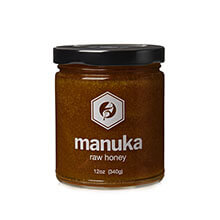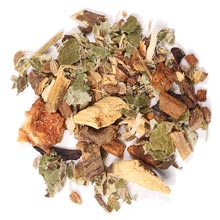4 Healing Benefits of Raw Honey
September 21, 2022
by Diana Rosen

From the Mayo Clinic, "honey contains mostly sugar, as well as a mix of amino acids, vitamins, minerals, iron, zinc and antioxidants. In addition to its use as a natural sweetener, honey is used as an anti-inflammatory, antioxidant and antibacterial agent. "
The antioxidant, antibacterial, and anti-inflammatory elements of honey make it an excellent wound dressing and go-to agent for clearing infection, thanks to its high acidity, hydrogen peroxide content, and osmotic effect (the ability to close wounds.)
Note: For severe wounds like deep cuts with severe bleeding, get to an ER as soon as you can. For minor abrasions and cuts, honey may assist in first-aid treatment.
Manuka Honey

The best reason to try Manuka honey is excellent with tea or coffee and wonderful in hearty breads and scones. We import ours directly from Australian beekeepers.
Like all honeys, it also has healing properties, and it is believed that Manuka honey is particularly suited for wound healing.
It is made from the pollen of the Manuka tree (Leptospermum scoparium). It has exceptional levels of anti-bacterial phytochemicals, high non-peroxide levels, antimicrobial properties, and a Unique Manuka Factor (UMF) which indicates a high potency rating. These properties help resist infection.
Note: Anyone allergic to bee pollen should not use honey as an antiseptic.
Manuka Honey is a monofloral varietal of honey produced in New Zealand and Australia from the nectar of the Manuka tree. Characterized as earthy, complex, and slightly mineral, it has a hint of menthol which leaves a smooth, cool mouthfeel.
Its health benefits include methylglyoxal (MGO), a naturally- occurring compound that makes Manuka honey so effective as a healing agent. Adagio Bees’ Manuka honey has been certified as MGO 100+ (>100mg/kg which is the Australian honey's methylglyoxal (MG) content, and greater than 100.
Four Ways Honey Aids Healing
Here are four ways that honey is known to assist in healing:1. Treating Minor WoundsAs with all treatments, begin by washing your hands thoroughly.
Use sterile gauze and cotton tips.
Pour a small amount of honey onto the dressing first, then affix the dressing to the wound. This reduces messiness. If the wound is quite small, a bandage will suffice. The top choice of a dressing is an occlusive one because its waxy coating will help prevent the honey from seeping out with its stronger seal.
It is possible to use honey to fill the wound area before dressing it if there is an abscess, but whenever this occurs, seek a health practitioner if at all possible.
Replace the dressing each time the drainage seeps into it. You will need to change the dressing fewer times as the wound heals.
Take care to wash your hands again after dressing the wound and each time you replace the dressing.
The medical industry offers medical grade honey and honey-infused gauze bandages which are, of course, the ideal, however, using Manuka or other Adagio Bees raw honey on minor wounds may help be effective treatment.
2. Colds and Cold-like Symptoms

Swallowing a teaspoonful can assist in healing a sore throat. Adagio's Wellness Teas help, too. Try a little honey with our Throat Therapy to start feeling better.
Tea in honey helps with respiratory congestion and sore throat when you have a cold or cough.
If your cough is persistent, mix it with a little lemon juice and coconut oil. The oil helps calm the pain of a cough and the lemon juice helps the honey with its healing effect. Check out wellness teas. Add a little honey to Breathe Well herbal tea to help minor congestion from colds.
3. Bug Bites
A dab on a mosquito bite reduces both the itch and irritation and helps prevent infection that might occur if you cannot resist scratching!
4. Minor Burns
It may also offer some pain relief for light burns and minor abrasions so keep a jar handy in both the bathroom first-aid kit and in the kitchen, and take along a jar if you’re an avid camper or hiker.
Note: Honey should not be given to infants or pregnant women without first consulting your doctor or health practitioner. For any medical applications, use our raw honeys, not flavored or whipped.
